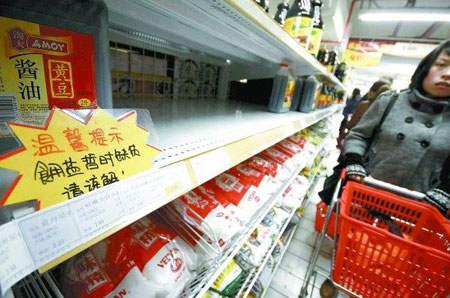管理员
 "Have you bought any salt yet?" became a common form of greeting.
"Have you bought any salt yet?" became a common form of greeting.
As the Japanese queued at supermarkets that imposed rations on purchases of daily goods due to shortages in post-quake Japan, the Chinese engaged in ridiculous panic buying of salt, resulting in supermarkets in some major Chinese cities to run out.
A few days after a 9-magnitude earthquake rocked Japan, triggered a tsunami and later a nuclear crisis, rumors circulated across China via internet forums, micro blogs, mobile text messages, and words of mouth that intake of salt, which contains iodine, could prevent sickness from nuclear radiation exposure.
There were also rumors about the radiation leaks from Japan nuclear power plants could contaminate sea salt production, and could possibly lead to salt shortage and price hike in the near future.
Prior to that, there are rumors quoting a BBC news alert (which has since issued a disclaimer) about the radiation leaks from Japan could travel as far as Philippines, and fear surged in China, which is located much closer – just over some 2000 km – to Japan.
An era of rapid dissemination of information is also an era of rumors. Over the last few days, I have seen how some of my co-workers and neighbors, upon learning the salt-rumor, had made phone calls to their mothers, fathers, in-laws, sisters, brothers, aunties, uncles, girlfriends, boyfriends, housemates, etc – reminding them to drop by supermarkets to pick up a few more packs of salt.
The panic buying not only left supermarkets void of salt, it has also driven up stock prices of companies in the salt industry. Some unscrupulous businesses have also upped salt prices – some purportedly selling boxes of salt (which contains 40 to 50 packets) for between 400 and 600 renminbi - up from the original 40 to 60 yuan.
Yet, a handful of consumers have fallen for it, paying ten times the price to stock up salt that could last a few months to a year! The canteen operator for the company I work for, however, decided to hold back bulk buying, "this is crazy, if I order salt at that price, my already slim profit margin will turn negative," says the cook. Well, perhaps one good thing out of this drama is that our canteen food will be less salty in the coming weeks.
What causes such panic buying? Is it really just because of fear? I believe fear is only part of the reasons, and the factors that turn fear into panic are multiples. To a certain extend, the salt panic scenario is also unique to China.
To begin with, the general public's knowledge on nuclear radiation is limited. The word "nuclear" sounds familiar yet alien, what come to minds often are Armageddon-like images from movies such as "The Day after Tomorrow" or "2012".
When the public first read or heard from news reports about reactor overheated, nuclear power plant exploded, containment vessels breached, radiation dose up to 400 millisievert (mSv) ... how do they make sense of all these jargons? Delayed in timely explanations, and having authoritative scientists to speak in lay man terms, all these have led to a heightened fear.
In China, there's also a unique scenario – that people tend to take rumors seriously; and in the past, there were cases when rumors proved to be the truth. There's a confidence crisis in China, many of my Chinese friends would say, the people are doubtful of official stand and explanations.
In the past, there were incidents where public interests had been compromised, yet the authorities were in denial. Information control, media censorship, lack of transparency, and state monopoly, these have become part of the reasons that turn the public to unofficial channels to seek for the elusive "truth".
On the "salt incident", however, there are still many clear headed Chinese who have posted online messages to counter the rumors; some even turn to humor for attention, such as the many jokes that flood Chinese online forums recently, here are a few:
Delivery order scenario:
Customer: "please give me one portion of stew pork rice."
Restaurant reception: "which stew pork rice do you prefer? We have salt free one that costs 15 yuan; the one that adds salt costs 30 yuan; double portion salt costs 50 yuan; and we also have an extra salty package for 98 yuan, comes with a bottle of iodine-infused wine."
What's the most painful thing in the world?
We have run out of salt, but the nuclear radiation never arrive.
What's the most painful thing in the world?
Nuclear radiation comes onshore, but the salt remedy is ineffective.
What's the most painful thing in the world?
We have spent all our money on salt, nothing left for food.
What's the most painful thing in the world?
We are dying from salt overdose, yet the stock could still last forever.
Japanese who survived the quake, tsunami, and nuclear radiation leaks, have died from laughing too hard on the salt panic buying in China.
